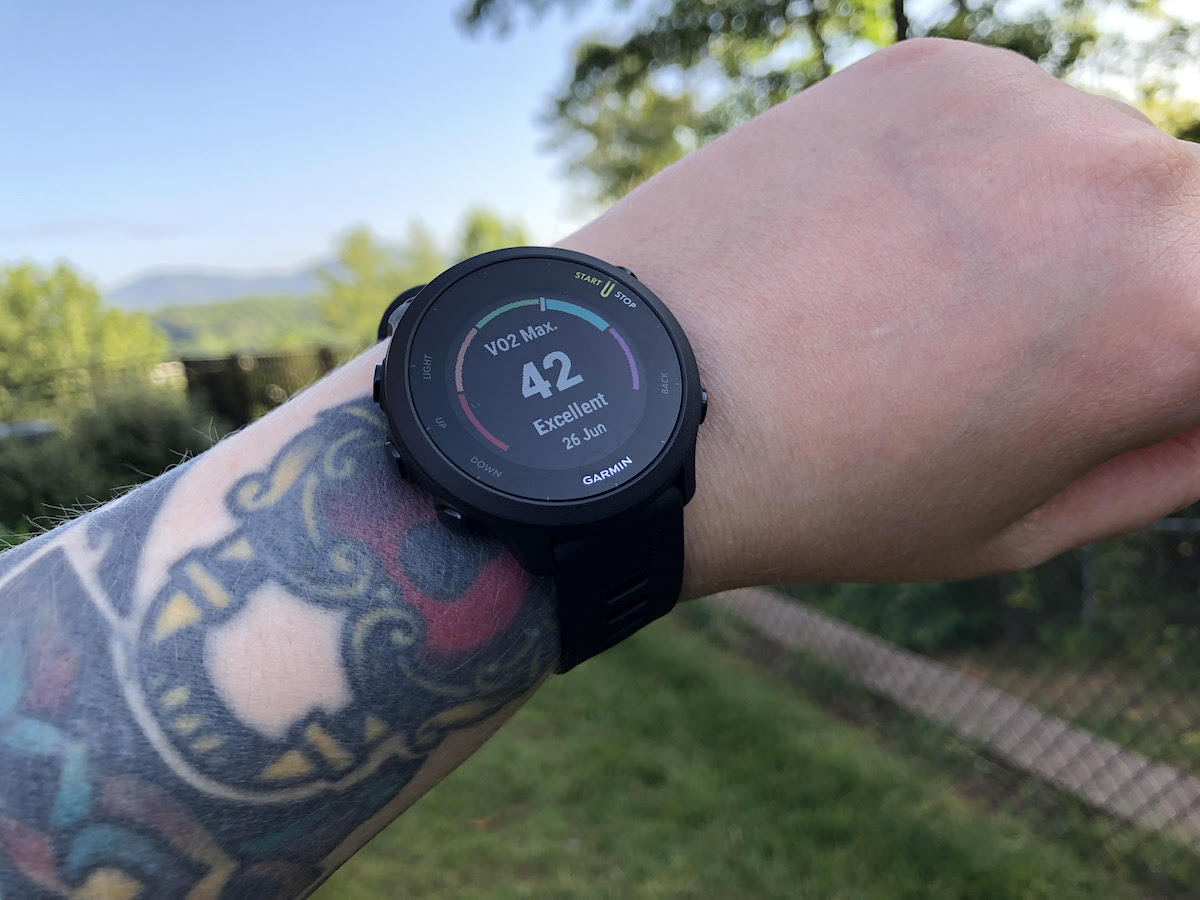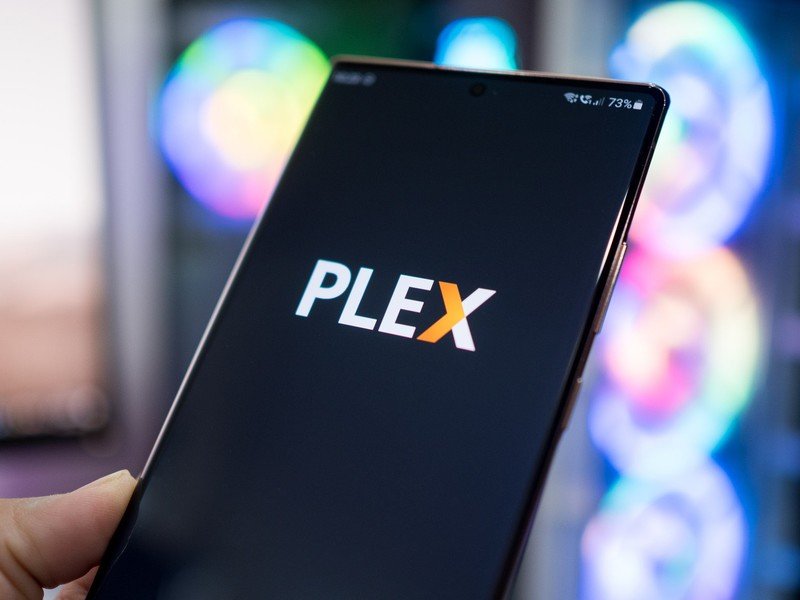Android Central Verdict
Bottom line: If you're looking for an affordable GPS smartwatch that's geared toward runners of all skill levels, the Garmin Forerunner 55 is a solid choice. Not only do you get GPS, heart-rate monitoring, and basic activity tracking, but you also get some advanced running features that will provide you with insight to help you improve your performance.
Pros
- +
Onboard GPS
- +
Heart-rate monitoring
- +
Activity/sleep tracking
- +
Advanced running features
- +
Lightweight design
- +
2 weeks of battery life
Cons
- -
Lacks altimeter and SpO2 sensor
- -
No music storage or NFC payments
- -
Only one size option
Why you can trust Android Central
If you want to get serious about tracking your runs and other workouts, you're going to need a specific kind of Android smartwatch for the job. When it comes to finding a lightweight design, excellent battery life, superior fitness tracking, and advanced running features, you might find yourself looking at the Garmin Forerunner 55. It's definitely an upgrade from the Garmin Forerunner 45, and it's fairly priced for all the improvements you get.
Anyone familiar with Garmin smartwatches knows that the lineup varies quite a bit, so it's important to understand where the Forerunner 55 stands. There are some premium options out there, like the Garmin Forerunner 945 LTE, which is mostly geared toward more experienced users and professional runners who need detailed metrics and cellular access for emergencies. If you consider yourself an elite athlete such as a distance runner, cyclist, or triathlete, the Garmin Forerunner 745 might call your name.
It's not uncommon for beginners and even intermediate athletes to shy away from these extremely advanced smartwatches saddled with hefty price tags and more features than they need or know how to use. However, the Forerunner 55 is a great place to start if you're a new runner or someone who's starting to track their workouts for the first time. It's on the low end as far as price is concerned, but you still get a wide array of features that go beyond basic activity tracking. If you're eager to take your fitness tracking up a notch without getting in over your head, this smartwatch is a worthwhile option to consider.
Garmin Forerunner 55: Price and availability
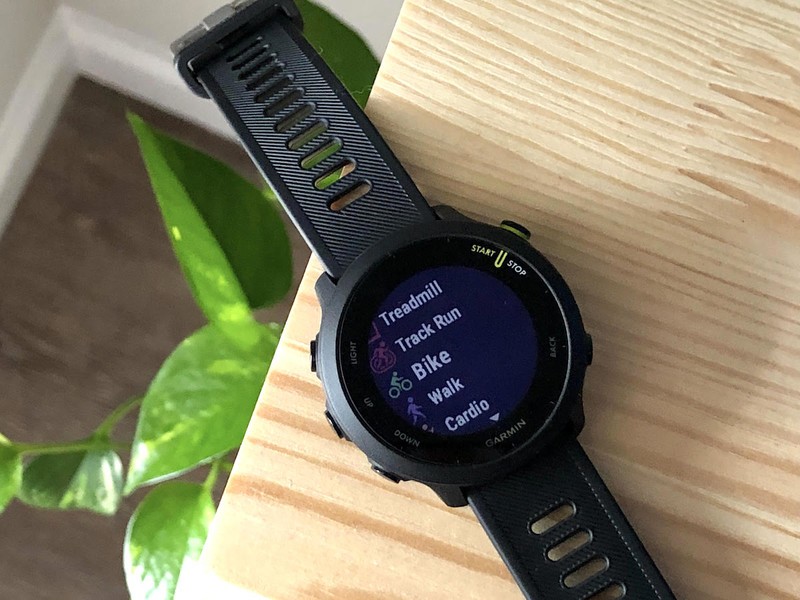
The Garmin Forerunner 55 was announced on June 2, 2021, alongside the Forerunner 945 LTE. It's available for purchase for $199.99 through Garmin's website as well as other major retailers. This long-awaited upgrade to the Garmin Forerunner 45 is available for purchase at Amazon, Walmart, B&H, REI, and more.
Garmin Forerunner 55: What's good
One of the first things you'll notice about any of the Forerunner models is that they all look fairly similar. They're not exactly fashion icons, but the ultra-lightweight design is exactly what most athletes need in a smartwatch. It comes in a 42mm plastic case available in black, white, and aqua.
You get a 1.04" sunlight-visible, transflective display. Regardless of how bright the sun is shining, you'll be able to read what's on the screen without a problem. As expected, you get a 5 ATM rating for water resistance, so it can withstand pressures equivalent to a depth of 50 meters. Despite this being a feature on the previous model, the Forerunner 45 did not offer swim tracking. Fortunately, the new model takes care of that.
You'll find five physical buttons on the Garmin Forerunner 55. The three on the left side (from top to bottom) activate the backlight, scrolling up, and scrolling down, respectively. The top button on the right side starts or stops a workout and makes selections. The bottom right button takes you back to the previous menu.
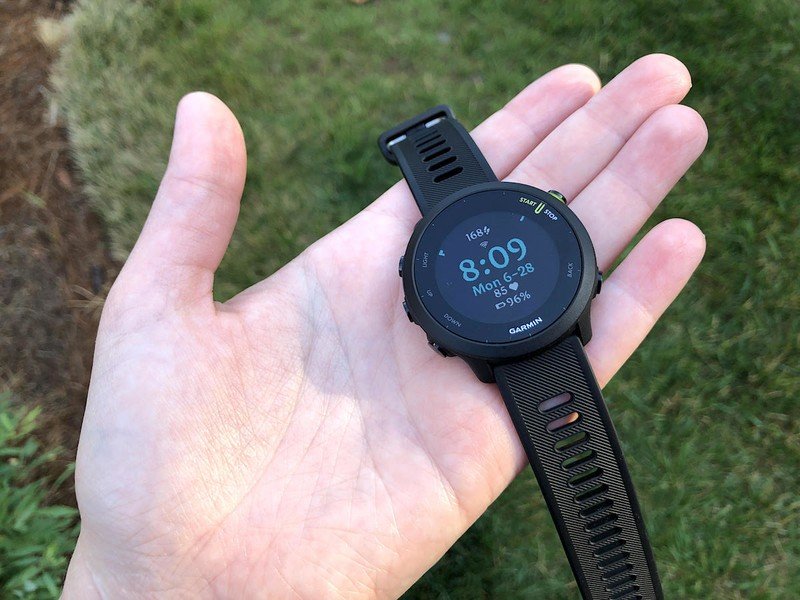
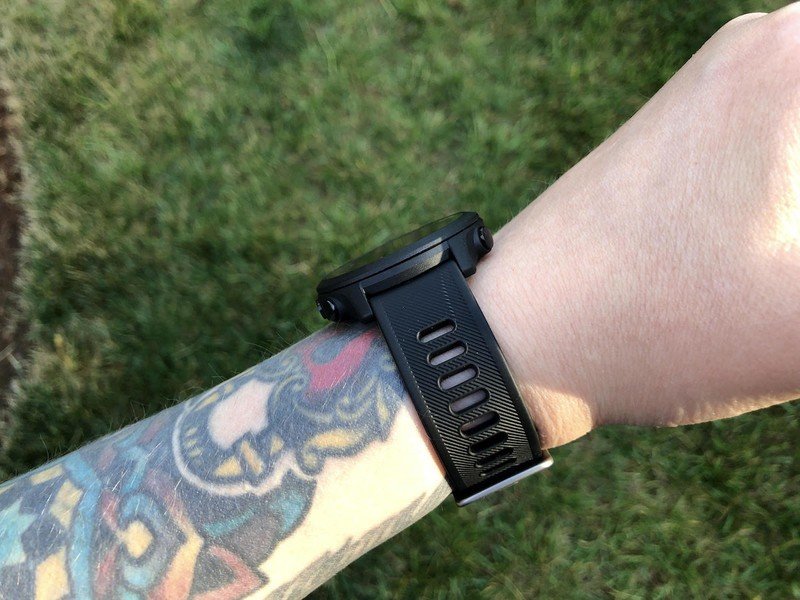
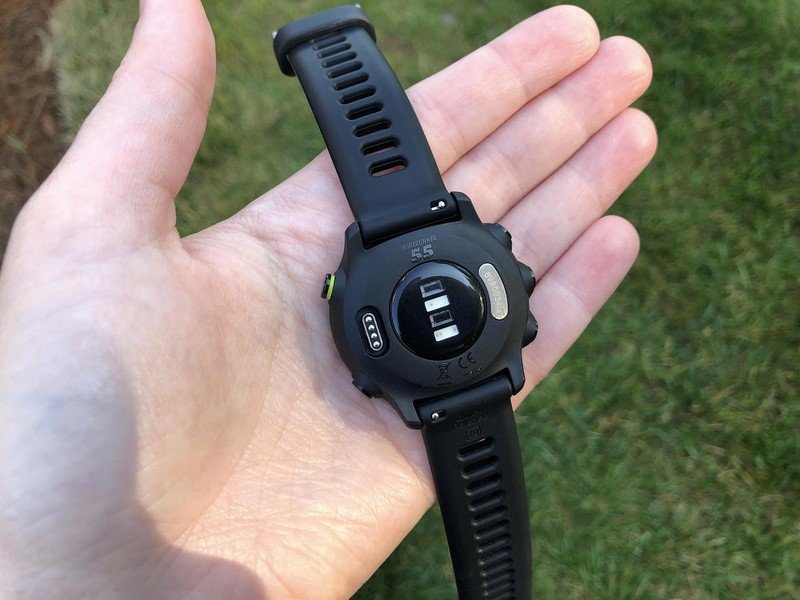
Source: Courtney Lynch / Android Central
One improvement is that the Forerunner 55 bands are interchangeable. The company went with 20mm quick release silicone bands, which is an industry standard. It's easy to find tons of third-party options when you feel like mixing up the look or feel of your smartwatch band. The previous Garmin Forerunner 45 models required tools and screws for replacing the bands, which was a bit of a hassle.
The Garmin Forerunner 55 can last for up to 2 weeks on a single charge.
These models are known for offering good battery life, especially compared to other competitors, but this smartwatch takes it to a whole new level. The Garmin Forerunner 55 can last for up to 2 weeks on a single charge in smartwatch mode. In continuous GPS mode, it can last for up to 20 hours. Of course, these figures will vary depending on your usage and settings.
When it comes to personalizing your Garmin Forerunner 55, you'll be able to go about this in a few ways. Other than swapping out the band, you can change the watch face. A few standard options are available on the watch itself, or you can download your preferred watch face from the Garmin Connect IQ Store. Some of these allow you to change the color scheme and adjust the data sets on the main screen.
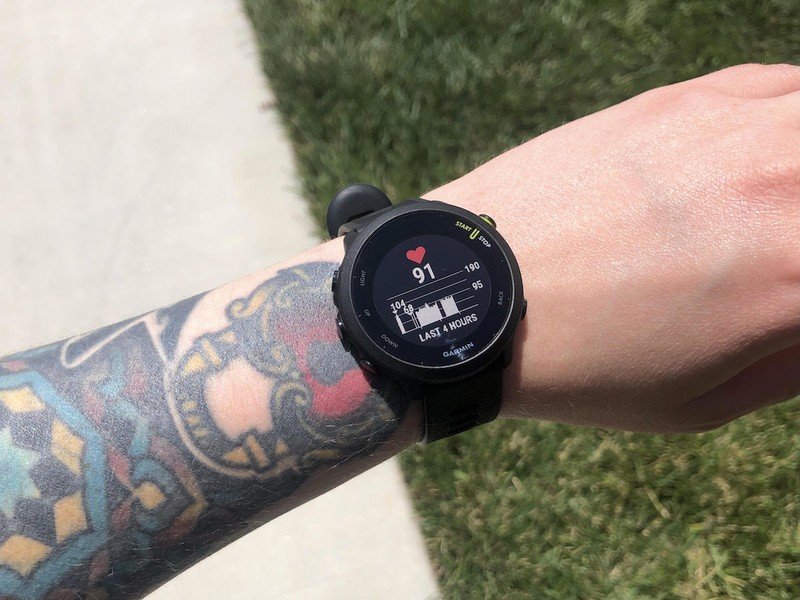
The Garmin Forerunner 55 carries over many of the standard tracking features from the previous model. You'll have built-in GPS, activity tracking, heart-rate monitoring, sleep tracking, stress monitoring, Body Battery energy monitoring, various built-in sport modes, and smartphone notifications.
You can find most of these standard features on pretty much every Garmin smartwatch. But the Forerunner 55 has many new features that make it stand out against some of the more basic models, including respiration rate and hydration tracking.
The Forerunner 55 also provides relaxation reminders when your stress levels are higher than normal. Another new feature is women's health tracking. Women now have the option of tracking their menstrual cycle or pregnancy in the Garmin Connect app.
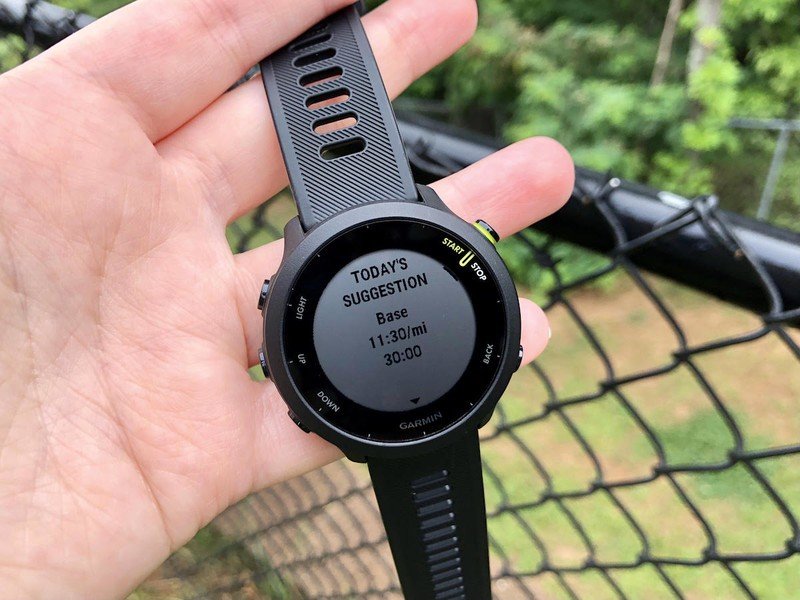
Some of the best improvements have to do with the new advanced running features. All of these are new and were not available on the predecessor. That doesn't mean that Garmin won't eventually plan to bring some of these perks over to the older Forerunner 45 model, but only time will tell.
Previously, the fitness age feature was only available on the Garmin Connect app, but now you can access it on the watch itself. This feature considers your chronological age, resting heart rate, age, weight, and BMI to estimate whether your body is younger or older than you are. You can also view tips on lowering your fitness age if that's something that interests you.
You'll receive daily suggested workouts based on your metrics.
Once you've spent some time using your watch, it will get to know you through your training history, fitness level, and recovery time. You'll receive daily suggested workouts based on your metrics. There's also a brief explanation of the purpose of the workout that's been suggested. If you're not sure what to work on when training for your next big run, this feature will come in handy.
Garmin says that each workout suggested is designed to provide an appropriate level of challenge while still satisfying a specific need or improving a particular performance aspect. For instance, your suggested workout will focus on building your endurance base on some days, while on other days your suggested workout will focus on facilitating recovery.
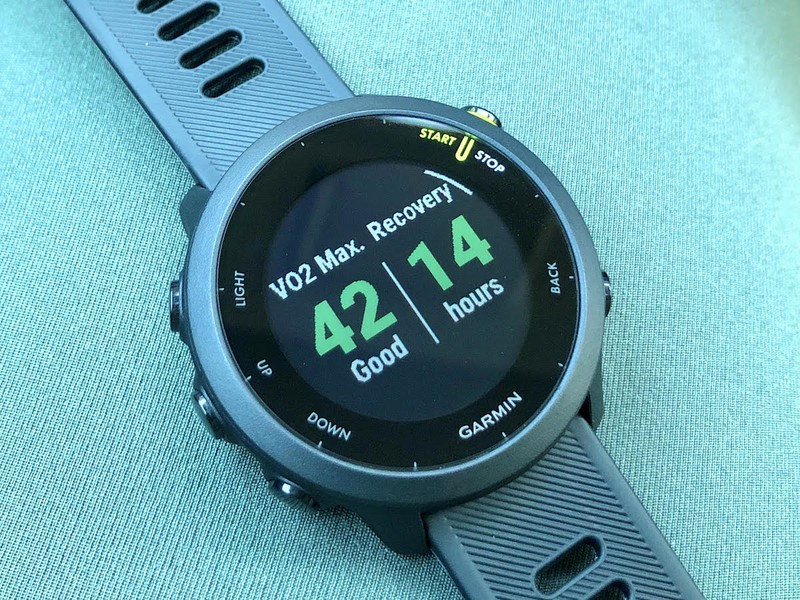
Speaking of recovery, the Garmin Forerunner 55 also has a recovery time feature. This perk provides personalized insight into how long it will be before your body fully recovers from an intense effort. When your recovery timer reaches zero, that indicates your body is ready to gain the maximum benefit from taking on another fitness-improving workout.
Frequent runners will benefit most from the recovery time feature. As you may know, attempting to challenge yourself with a tough workout before your body has had time to recover from the previous one can lead to unwanted strain and injuries.
The recovery time feature also accounts for a stressful day or a bad night's sleep.
The recovery time feature also accounts for a stressful day or a bad night's sleep. As a result, a longer recovery time may be recommended. Alternatively, good rest, low stress, and light daily activity can help shorten recovery time recommendations.
Recovery may be one of the most overlooked aspects when training. It's easy to think you should just keep going even when you're exhausted, but this will have negative effects. The good news is that this feature doesn't make random recommendations. Instead, it carefully analyzes your history and interprets performance data from your recorded activities to make an appropriate recommendation.
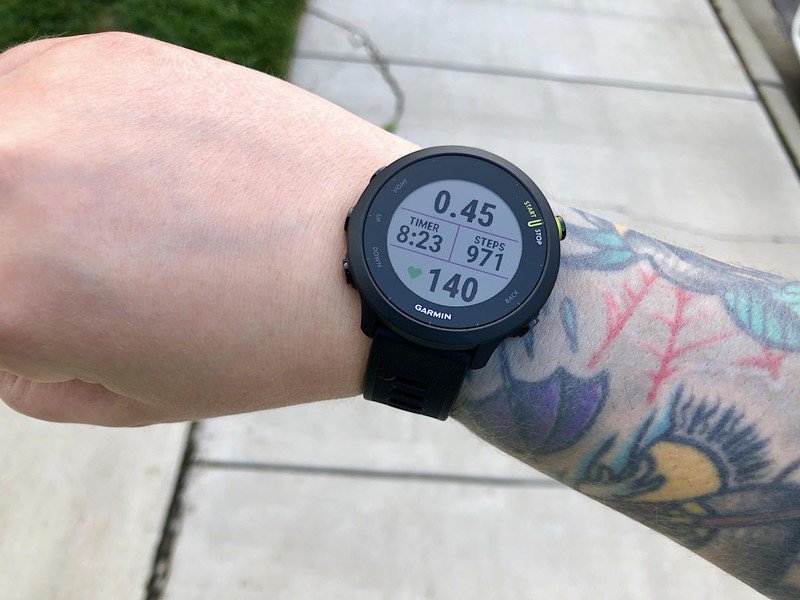
Starting and recording a workout has never been easier. One press of the top right button, and you'll bring up the workout menu. You can select your preferred workout and get started right away. You can also explore the options for that particular exercise. For example, you can set specific alerts that are triggered during your exercise. Some of the alert options include heart rate, time, distance, calories, and cadence.
The new cadence alerts feature is especially helpful. During your run, your watch will let you know when you've gone outside your target cadence range. You can also choose to be notified once you've entered your target heart rate zone.
The default data screen shows you basic metrics such as distance, time, steps, and heart rate. You can scroll to the next data screen to see your current heart rate zone. If you'd like, you can add other data screens that show additional metrics, such as calories and speed.
You'll have some new built-in sport modes on the Garmin Forerunner 55, including track running, virtual running, pool swimming, Pilates, and HIIT. If you want to feel safe while you're out running, there are safety features that give you peace of mind. You'll be able to enter up to 3 emergency contacts that you can choose to notify if you need assistance.
Garmin Forerunner 55: What's not good
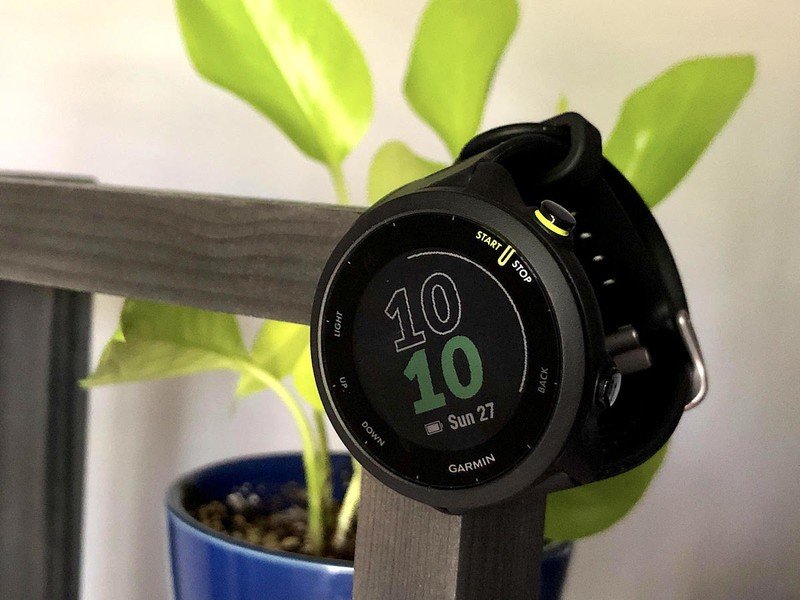
As I mentioned earlier, the Garmin Forerunner 55 isn't exactly winning any style awards. Despite the design being a good fit for runners and other athletes, it could still use some work. While the sunlight-visible display is good for the outdoors, the resolution is exactly the same as the previous model. It's not sharp by any means, but it gets the job done.
On another note, if you enjoyed having two size options with the Garmin Forerunner 45, you might be disappointed that the new Forerunner 55 didn't follow in those footsteps. It only comes in the 42mm case size, while the previous model offered a smaller 39mm variant known as the Forerunner 45S.
Having to rely solely on the side buttons for navigation was an adjustment.
My next complaint comes down to a matter of personal preference, but it's still worth mentioning. Having to rely solely on the side buttons for navigation was an adjustment. There's no touchscreen at all, so if you're used to swiping and tapping, you might have your own adjustment period as well.
After having the opportunity to review other Garmin watches with touchscreens, it's undoubtedly my preferred method for navigating the user interface. I often found myself foolishly attempting to tap and swipe on the screen for the first few days of using the Forerunner 55.
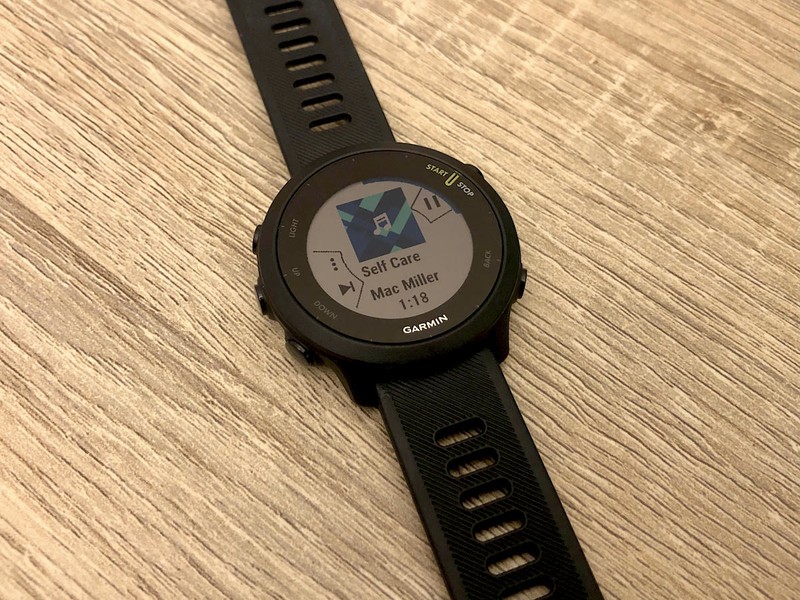
Call me spoiled, but I got accustomed to having an altimeter as well as a Pulse Ox sensor. These features are more prevalent in smartwatches these days — even among entry-level models. Unfortunately, neither of these are available on the Forerunner 55. No altimeter means you won't have access to elevation data.
No Pulse Ox sensor means you won't be able to track your blood oxygen saturation levels. You also won't be able to pat yourself on the back after getting a notification that you climbed the stairs to your third-floor apartment for the tenth time in a day. It may not be a huge loss, but I did miss having these features.
At this price point, it's probably not a huge surprise that you don't get any special extras. If you're a runner or any kind of athlete who prefers to leave their phone behind when you're working out, you won't be able to listen to phone-free music. The music controls are fine for playing, skipping, pausing, and adjusting the volume of what's playing on your phone, but they leave much to be desired. Another extra that's missing is NFC for contactless payments.
Garmin Forerunner 55: Updated features
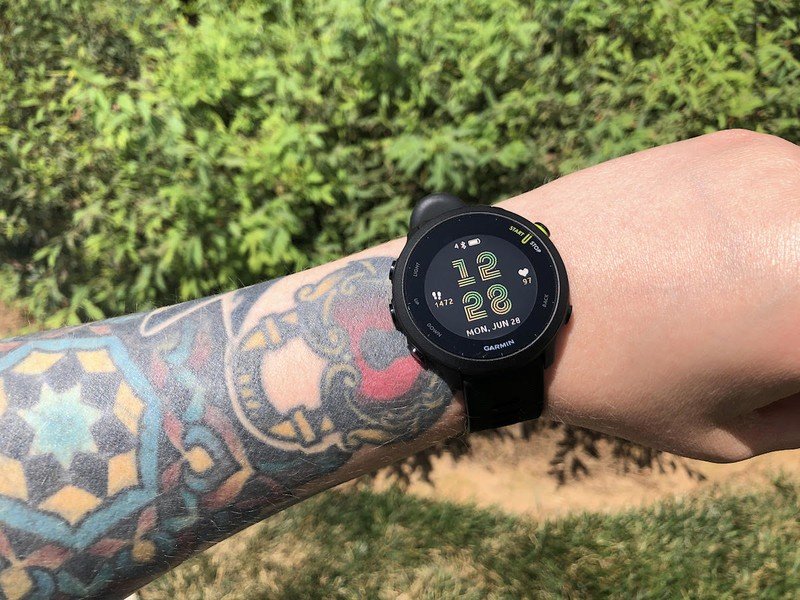
If there's one thing you can count on, it's that Garmin has always been good about providing ongoing updates for its devices. While it's still a new wearable, the Forerunner 55 is no exception. The most notable update, also known as Software Version 4.02, was rolled out in October 2021 with the following changes:
- Added support for stress from HRM strap during Yoga and Breathwork sports.
- Added notifications for disconnecting/reconnecting to a LiveTrack session.
- Improved software update process for external accessories.
- Lengthened duration of Find My Device vibration and beeping
- Added support for simultaneously broadcasting through ANT+ and Bluetooth.
Garmin Forerunner 55: Competition
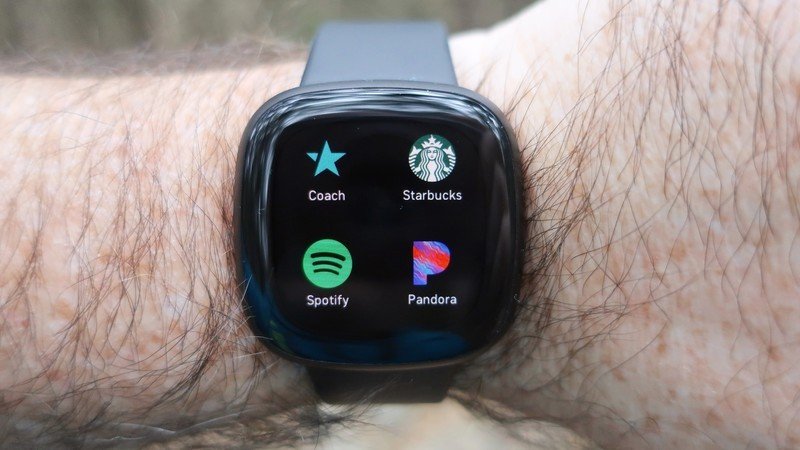
Considering that the Garmin Forerunner 55 caters to a specific group (primarily new runners), it has a leg up when it comes to competition. However, some begins might prefer a smartwatch that takes a broader approach. The similarly-priced Fitbit Versa 3 is one example. In fact, this is one of the best fitness smartwatches you can buy right now.
While it may not offer hyper-specific features for runners, the Fitbit Versa 3 does make up for some of the drawbacks of the Forerunner 55. You get an altimeter for elevation data, a SpO2 sensor for blood oxygen tracking, music storage, voice assistants, and contactless payments. If you're looking for a more well-rounded smartwatch as far as features are concerned, there are some amazing competitors worth exploring.
If you're already familiar with Garmin and want to find a smartwatch with more features, I'd recommend the Vivoactive 4. This has become my go-to smartwatch for just about everything. Sure, it's a bit more expensive, but it's worth it for the extra features you get. You get the altimeter, Pulse Ox sensor, two size options, music storage, and Garmin Pay. It's also worth mentioning that the Garmin Vivoactive 4 is easier on the eyes than the Forerunner 55.
Another watch that's available at a similar price point with more features is the new Samsung Galaxy Watch 4. Not only is this smartwatch more stylish than the Forerunner 55, but it also fills in the blanks when it comes to missing features that health enthusiasts might want. Some examples include blood oxygen tracking, electrocardiogram (ECG) readings, and a Bioelectrical Impedance Analysis (BIA) sensor for measuring overall body composition.
Garmin Forerunner 55: Should you buy it?
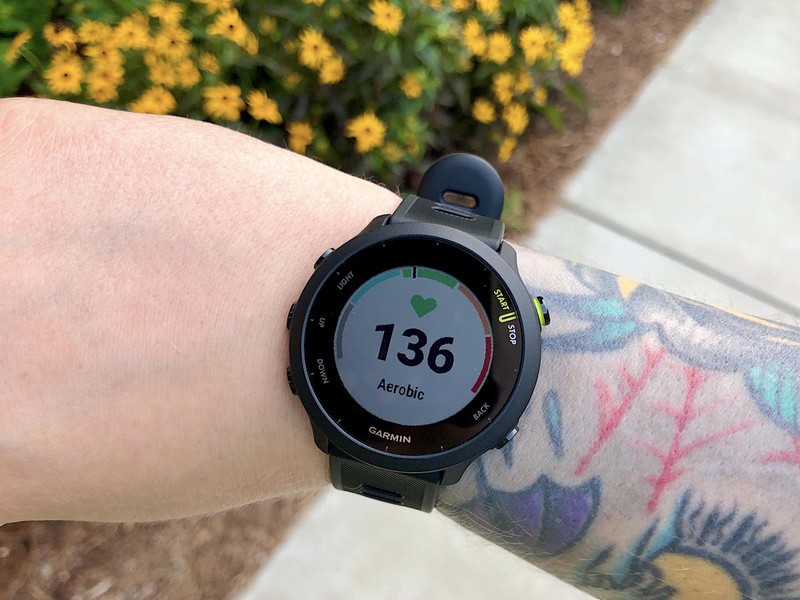
You should buy this if...
- You're buying your first GPS watch and want something affordable.
- Battery life is of the utmost importance to you.
- You're seeking a watch that balances ease of use with advanced running features.
You shouldn't buy this if...
- You're expecting a fashionable design.
- You don't have any use for advanced running features.
- You want bonus perks such as music storage, contactless payments, or a voice assistant.
It's clear that most runners will benefit from what the Garmin Forerunner 55 has to offer. Of course, if you're a professional athlete or someone with more advanced needs, it might fall short. With that said, beginners and casual runners who want to start tracking their workouts and monitoring their progress over time will love the affordability and features that this GPS smartwatch provides.
4 out of 5
When you look at all of Garmin's improvements to the Forerunner 55 since its predecessor, it's hard not to be impressed. This GPS smartwatch boasts superior battery life, a more user-friendly design with quick release bands, advanced running features, and additional sport modes.
It may not have an altimeter or SpO2 sensor, but most people will get by just fine without these additions. It's an unbeatable value despite not having any smartwatch-y features such as music storage or Garmin Pay. The company is known for offering an endless lineup of wearables, so it's always possible to find a watch that meets your needs. The Garmin Forerunner 55 is for both beginners and casual runners who want an affordable GPS smartwatch with tremendous fitness tracking and running features.
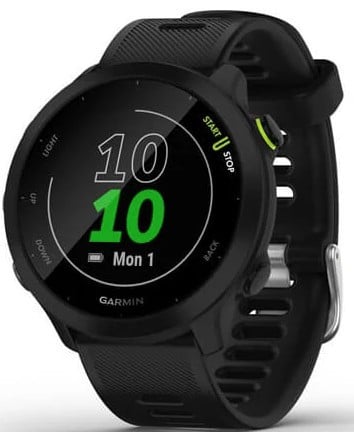
Garmin Forerunner 55
Bottom line: The Garmin Forerunner 55 proves that GPS smartwatches can be affordable and efficient. It's not a high-end watch like some of Garmin's other wearables, but it's more than capable of catering to runners who want to track their workouts and receive important details that will help them become better athletes.
Review Changelog, November 2021
This article was originally published in July 2021.
It was updated in November with the following changes.
- Updated pricing to reflect recent sales.
- Added "Updated features" section.
- Added mention of updates that came with Software Version 4.02.
Courtney Lynch is a freelance writer at Android Central. She's obsessed with all things health, fitness, and music. At any given time, she can be found checking out the latest and greatest gadgets while simultaneously petting her dog and sipping iced coffee.
